Updating build status for commits
Developers can integrate third-party build servers with Bitbucket Data Center using the
builds API.
By posting build results to a REST end-point in Bitbucket Data Center, build servers can store and update the build status of a commit. Bitbucket Data Center keeps a running tally of which builds have passed and failed for each commit and displays build results in the UI.
The examples below use cURL, a cross-platform command-line utility for transferring data over a variety of protocols. In real life you can use any programming language or tool capable of making an HTTP request to integrate with the build integration API.
Adding a build result to a commit
To associate a build result with a particular commit, you need to POST a JSON object to the build status REST resource at:
1 2http://{baseurl}/rest/api/latest/projects/{projectKey}/repos/{repositorySlug}/commits/{commitId}/builds
The format of the JSON object that should be used as the request body is:
1 2{ "key": "<build-key>", "state": "<INPROGRESS|SUCCESSFUL|FAILED|CANCELLED|UNKNOWN>", "url": "<build-url>", "buildNumber": "<build-number>", "description": "<build-description>", "duration": <build-duration>, "lastUpdated": <build-last-updated-timestamp>, "name": "<build-name>", "parent": "<build-parent>", "ref": "<build-ref>", "testResults": { "failed": n, "skipped": n, "successful": n }
The state, key and url fields are required. All other fields are not required. If the name field is present, it'll be displayed to users in the UI.
The state refers to the current state of the build that is the subject of the request:
INPROGRESSindicates that a new build targeting the specified commit has started.SUCCESSFULindicates that a build targeting the specified commit has completed successfully.FAILEDindicates that a build targeting the specified commit has failed.CANCELLEDindicates that a build targeting the specified commit has been cancelled.UNKNOWNindicates that the system doesn't know the current status of the build.
See Updating Build Results for more about states.
Note that the request doesn't specify a repository. This is because the same build information will be shared across all repositories containing the targeted commit. In practice this means forks of the same repository stored in Bitbucket Data Center will all display the same build information for common commits.
Multiple builds
If a single commit was built by multiple build plans, you can POST multiple results for the same commit. Each result
must have a different key attribute.
Updating build results
Bitbucket Data Center stores one build result for each key per commit, so you can update a previous build result by sending a request with:
- the same commit hash; and
- the same
keyattribute.
The new result will replace the previously submitted build result for that commit hash and key.
This is useful for transitioning a particular build result from INPROGRESS to SUCCESSFUL when a build completes, or
for replacing a FAILED build result with SUCCESSFUL one if a build is re-built at the same commit.
Note that a build result doesn't necessarily have to be submitted as INPROGRESS before being submitted as
SUCCESSFUL or FAILED.
Viewing build results
The build status for a particular commit is visible in:
- the commit list view, for any repositories containing the commit;
- the pull request header, for any pull request where the commit is the head of the branch to merge; and
- the metadata section of the commit page.
You can also retrieve build status information and individual build results for commits using the GET methods on the
build API.
Example
In the example, we'll make three requests to the build integration API, each supplying a new build result for a particular commit. This simulates a simple project with three different builds targeting building the same commit from a repository. These could be a unit test build, an integration test build and a database matrix build (for example).
One green build
The following curl command will add a build to the commit 9e72f04322c4a1f240e0b3158c67c3c19cdd16e7:
1 2curl -u username:password -H "Content-Type: application/json" -X POST http://{baseurl}/rest/api/latest/projects/{projectKey}/repos/{repositorySlug}/commits/9e72f04322c4a1f240e0b3158c67c3c19cdd16e7/builds -d @build0.json
Where build0.json contains:
1 2{ "state": "SUCCESSFUL", "key": "REPO-MASTER", "name": "REPO-MASTER-42", "url": "https://bamboo.example.com/browse/REPO-MASTER-42", "description": "Changes by John Doe" }
If you're trying the examples above, note that you'll need to change the hash to one that references a commit in one of your repositories.
The result is that one successful build is associated with that commit. On the commit page you should now see a
Builds section with 1 build and a green check mark, like this:
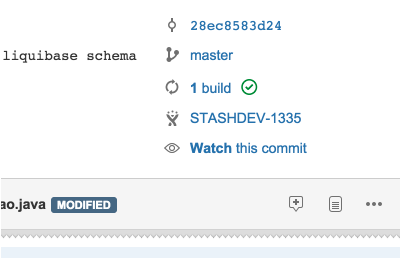
Two green builds
Posting a second successful build result to the same URL will update the commit's build status to include two successful builds.
1 2curl -u username:password -H "Content-Type: application/json" -X POST http://{baseurl}/rest/api/latest/projects/{projectKey}/repos/{repositorySlug}/commits/9e72f04322c4a1f240e0b3158c67c3c19cdd16e7/builds -d @build1.json
Where build1.json contains:
1 2{ "state": "SUCCESSFUL", "key": "REPO-MASTER-INTEGRATION", "name": "REPO-MASTER-INTEGRATION-17", "url": "https://bamboo.example.com/browse/REPO-MASTER-INTEGRATION-17", "description": "Changes by John Doe" }
This updates the build status shown in the UI:
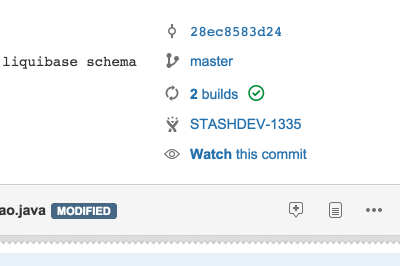
Sweet! Two successful builds. But wait..
Oh no! A red build
Posting a failed build result to the same URL will update the commit's build status to failed.
1 2curl -u username:password -H "Content-Type: application/json" -X POST http://{baseurl}/rest/api/latest/projects/{projectKey}/repos/{repositorySlug}/commits/9e72f04322c4a1f240e0b3158c67c3c19cdd16e7/builds -d @build2.json
Where build2.json contains:
1 2{ "state": "FAILED", "key": "REPO-MASTER-DAO", "name": "REPO-MASTER-DAO-33", "url": "https://bamboo.example.com/browse/REPO-MASTER-DAO-33", "description": "Changes by John Doe" }
This updates the build status shown in the UI to indicate that there is at least one failing build:
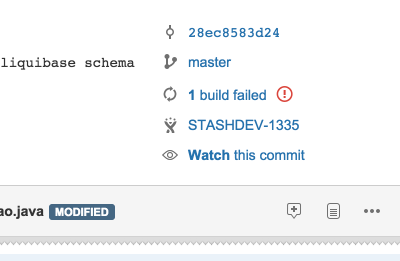
Clicking on the build status link in the UI will display a list of all builds associated with the commit. It looks like this:
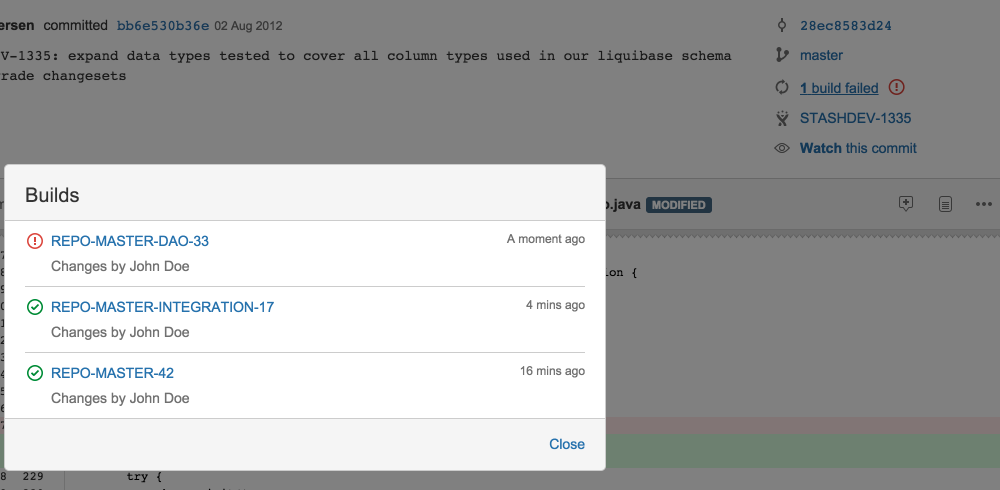
Note that the name and description fields from the posted JSON objects for each build result are being displayed
to the user. The name of each build is linked to the provided url.
False alarm, it's green now
Perhaps that build failed due to some infrastructure issue. Let's pretend that the build has been re-run and a new successful result has been posted to our commit's build status URL:
1 2curl -u username:password -H "Content-Type: application/json" -X POST http://{baseurl}/rest/api/latest/projects/{projectKey}/repos/{repositorySlug}/commits/9e72f04322c4a1f240e0b3158c67c3c19cdd16e7/builds -d @build3.json
Where build3.json contains:
1 2{ "state": "SUCCESSFUL", "key": "REPO-MASTER-DAO", "name": "REPO-MASTER-DAO-34", "url": "https://bamboo.example.com/browse/REPO-MASTER-DAO-34", "description": "Re-run by Sys Admin" }
Since this update has the same key as the previously failing build result, it overwrites it. This updates the UI,
showing users that there are now three passing builds:
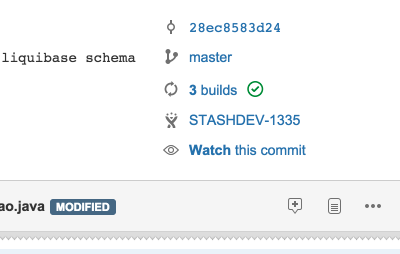
Rate this page: